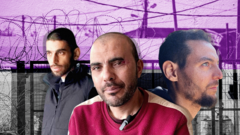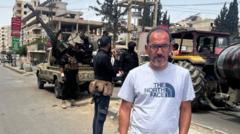Interviews reveal chilling testimonies of chemical burns, electric shocks, and brutal treatment faced by Palestinian detainees in Israel, raising serious human rights concerns.**
Eyewitness Accounts of Torture: Released Gazan Detainees Demand Justice**

Eyewitness Accounts of Torture: Released Gazan Detainees Demand Justice**
Former Palestinian prisoners recount their harrowing experiences of abuse and torture in Israeli detention following their release back to Gaza.**
In a series of shocking revelations, Palestinian detainees released back to Gaza have shared their traumatic experiences of alleged torture and mistreatment while held by Israeli authorities. Speaking to BBC reporters, the men detailed experiences that include chemical burns, beatings, and electric shocks, shedding light on serious allegations of misconduct within Israeli detention facilities.
The accounts come after the men were released under a ceasefire arrangement following a recent military conflict, but they assert that their ordeal began upon arrest. Mohammad Abu Tawileh, a 36-year-old mechanic, recounted how he was set ablaze with chemicals, leading to severe injuries. "I thrashed around like an animal in an attempt to put the fire out on my body," he recalled, illustrating the nightmare faced by detainees.
The men were held under Israel's Unlawful Combatants Law, which allows for indefinite detention without charges based on suspected ties to militant groups like Hamas. Despite being accused of affiliation, none of the detainees questioned were connected to the recent attacks. Their testimonies reveal a consistent pattern of abuse, alleging that they experienced severe physical and psychological torture during their captivity.
Testimonies included harrowing descriptions of being stripped, blindfolded, and subjected to electric shocks. Some detainees claimed they witnessed fellow prisoners die from mistreatment or medical neglect. Others spoke of sexual abuse, an accusation that has surfaced across various reports by human rights organizations.
Despite numerous allegations, the Israel Defense Forces (IDF) and the Israeli Prison Service (IPS) denied these claims of systematic abuse. In a statement, the IDF asserted that it would conduct investigations into specific cases but did not address the individuals' allegations directly.
Legal experts have raised grave concerns, suggesting that the treatment described by detainees aligns with recognized definitions of torture under both international and Israeli law. Dr. Lawrence Hill-Cawthorne of the University of Bristol stated, "The treatment the men described was entirely inconsistent with both international law and Israeli law," emphasizing that all detainees must be treated humanely regardless of allegations against them.
Conditions faced by the detainees further deteriorated as they described minimal access to food and medical care, with reports of severe weight loss and untreated ailments persisting upon their release. The men now confront not only physical scars but also significant psychological turmoil.
The chilling narratives have ignited discussions about the human rights violations reported within Israeli detention centers, drawing international attention to the treatment of Palestinian detainees. These harrowing accounts not only serve as a call for justice and accountability but also highlight the ongoing humanitarian crisis within the region. The demand for change in the treatment of detainees is more pressing than ever, as patrons of human rights worldwide call for an end to such alleged violations.




















